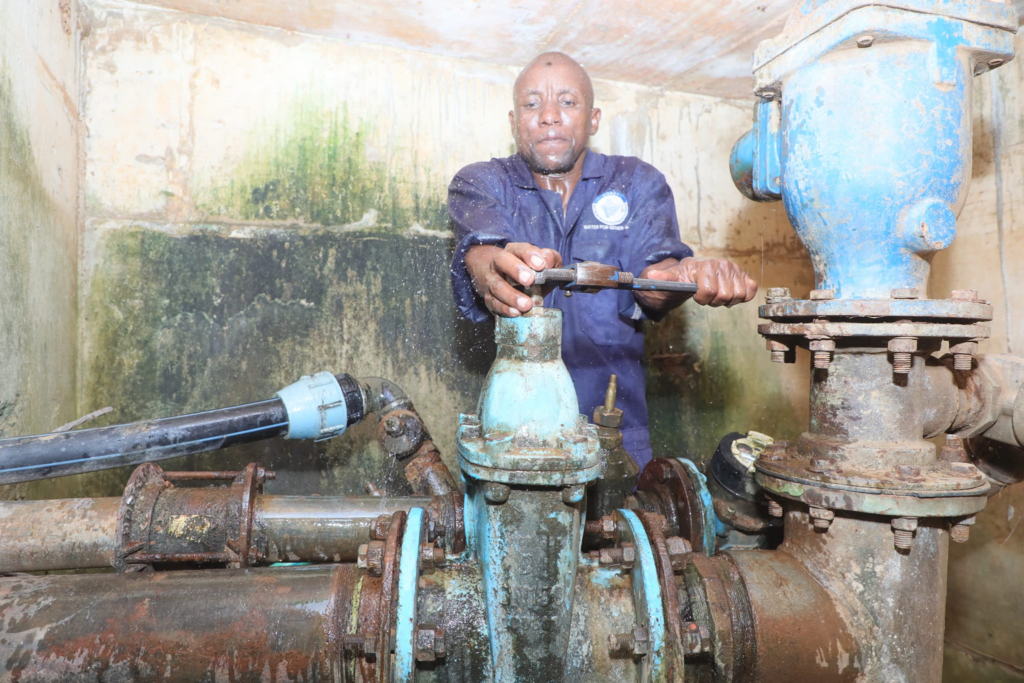
Voi households demand accountability from TAVEVO » Capital News
VOI, Kenya, May 6 — Residents of Voi are expressing growing frustration over persistent water shortages that have plagued the region since April, with water users blaming the county-owned utility for an emerging pattern of unreliable supply.
The Taita Taveta Water and Sewerage Company (TAVEVO) has long faced public backlash for its failure to communicate supply interruptions and resolve long-standing debts to its bulk water supplier, the Coast Water Works Development Agency (CWWDA).
At the height of TAVEVO’s standoff with CWWDA in December 2023, Moi County Referral Hospital plunged into a sanitation crisis following a week-long water outage that was only resolved after protracted negotiations.
The current supply disruptions, affecting both urban and peri-urban households within TAVEVO’s distribution network, have been linked in part to historical debts owed to CWWDA.
Public concern has deepened following revelations in the Auditor General’s 2023/24 report, tabled before the Senate County Public Investments Committee, which exposed widespread financial mismanagement and operational inefficiencies within the utility company.
“We’re going for days without water, and no one is telling us why,” said Esther Mwakio, a resident of Voi. “We deserve better from a company that’s supposed to deliver a basic service.”
Another user from Gimba, on the outskirts of Voi town, accused the provider of taking its customers for granted.
“The current state of affairs is completely unacceptable. The management must be accountable,” said Catherine Wachia on Friday, after the company failed to honour its rationing schedule for the second consecutive week.
TAVEVO has not issued a public statement since the shortages began in mid-April, only reposting a CWWDA update on April 27 regarding the resolution of a fault along the main bulk pipeline from Mzima Springs.
The firm’s Technical Officer for Voi, Luka Sio, did not repond to queries regarding the prolonged water supply challenges.
Sh386mn lost in leakages
Concerns over water availability in Voi and surrounding areas persist amid revelations that TAVEVO lost an estimated Sh386 million in non-revenue water (NRW) — water that is produced but not billed due to leakages, theft, or poor metering.
Out of 6.15 million cubic meters of water produced in the financial year, only 3.08 million were billed.
A staggering 3.07 million cubic meters — nearly 50 per cent — were unaccounted for.
The 50 per cent NRW rate marks a sharp rise from 42 percent the previous year and is double the maximum threshold of 25 percent set by the Water Services Regulatory Board (WASREB).
At an average billing rate of Sh134 per cubic meter, the water losses translated to a revenue shortfall of Sh386,226,670.
Senators remarked that the losses indicate a failure by TAVEVO’s management to implement essential controls — such as addressing illegal connections, repairing burst pipes, and enhancing monitoring systems — which could threaten the company’s financial viability.
Disputed fees, unverified balances
The audit further raised concerns about a lease fee obligation of Sh129.4 million that TAVEVO recorded despite lacking a formal agreement with CWWDA.
Management conceded that no payments had ever been made and that billing ceased in 2021.
The unresolved lease liability, together with pending payments for bulk water supply, is believed to be a key contributor to ongoing service disruptions — although TAVEVO has yet to publicly clarify the extent of the impact.
Auditors also flagged inconsistencies in bank balances after TAVEVO failed to provide revised reconciliations for adjustments made to four bank accounts.
A Sh3 million deposit under Posta Pay remains unsupported, while a discrepancy of Sh1.6 million was noted between water billing records and the company’s reported revenue.
Further, the report questioned the accuracy of a Sh47 million variance in the company’s inventory, and highlighted that TAVEVO had failed to recognize donated assets, including ten vehicles and fourteen motorcycles from CWWDA, in its books.
Another red flag was the lack of itemized disclosure for Sh152 million received in grants, contrary to public sector reporting requirements.
The audit also faulted the company for spending Sh2.6 million on legal fees arising from breaches of employment and commercial contracts — costs that auditors said could have been avoided if proper internal procedures had been followed.
The amount includes Sh1.05 million related to employment disputes, Sh366,658 paid to a supplier through a legal firm, and Sh1.28 million paid to the Company Secretary without supporting appointment documents.